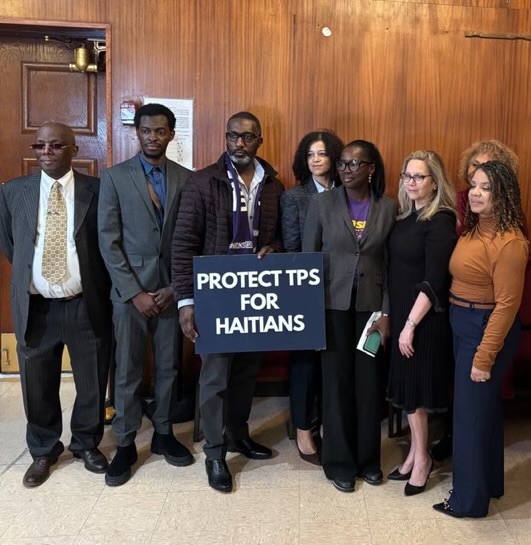In the wake of the Trump administration’s Feb. 20 decision to rescind Temporary Protected Status for Haitian immigrants, Congress Member Laura Gillen has introduced a bipartisan bill to extend the impermanent immigration designation.
Her action provides potential relief to Long Island’s tens of thousands of Haitian residents, including over 26,000 in Nassau County.
Gillen announced the bill, which proposes the extension of TPS protections for Haiti for 18 months past Aug. 3, the date the Trump administration has slated it to end, at an Elmont press conference Friday morning. It is introduced jointly in the House of Representatives with Republican Congressman Mike Lawler of New York, and the Haiti Caucus Co-Chair, Democratic Congresswoman Sheila Cherfilus-McCormick of Florida.
“If [the Trump administration] won’t do the right thing and keep TPS in place for Haitians, Congress should take action,” Gillen said.
“The administration’s abrupt, unfounded decision to end Temporary Protected Status for Haitians will have a devastating impact on Long Island,” she added. “Our local economy will be impacted.”
She was joined by Democratic Assembly Member Michaelle Solages and Haitian community advocates at Friday’s conference.
Temporary Protected Status, or TPS, is a non-permanent immigration status created in 1990. It allows people from countries experiencing extreme violence, environmental disasters, or other humanitarian issues to live and work in the United States. Over 500,000 Haitians in the United States are currently eligible for this status, which has been offered by the U.S. since the devastating 2010 earthquake.
Gillen and Solages have been vocal critics of the Trump administration’s decision to rescind TPS for Haitians, calling the administration’s move cruel and unacceptable, as well as detrimental to Long Island’s community and economy.
“TPS holders work, pay household income and property taxes, and contribute to our economy,” Gillen said. “Almost 9% of all Haitian TPS holders nationwide live in New York. That means our neighbors, who have been protected under our laws, are now having the rug pulled out from under them and face being sent back to certain, life-threatening danger.”
Solages has noted previously that since the TPS designation for Haiti has been in place for over a decade, many Haitians protected under TPS have had children who are American citizens, meaning that families would have to decide between leaving their children or bringing them back to dangerous conditions in Haiti if the protections expired in August.
Legal challenges to the Trump administration’s decision have begun appearing in federal court. Three immigrant advocacy groups, including Haitian Americans United, and four Boston-based Haitian and Venezuelan migrants filed a lawsuit Monday challenging the reversal of both Haitian and Venezuelan TPS.
Gillen’s bill will need a majority vote in the House and Senate before it moves to President Trump’s desk, where his signature – or a veto-proof Congressional majority – will be necessary to turn the bill into law.



































